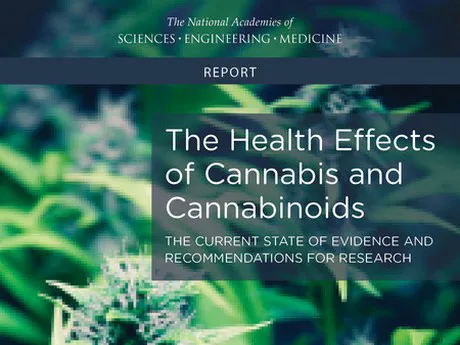Significant changes have taken place in the policy landscape surrounding cannabis legalization, production, and use. During the past 20 years, 25 states and the District of Columbia have legalized cannabis and/or cannabidiol (a component of cannabis) for medical conditions or retail sales at the state level and 4 states have legalized both the medical and recreational use of cannabis. These landmark changes in policy have impacted cannabis use patterns and perceived levels of risk.
However, despite this changing landscape, evidence regarding the short- and long-term health effects of cannabis use remains elusive. While a myriad of studies have examined cannabis use in all its various forms, often these research conclusions are not appropriately synthesized, translated for, or communicated to policy makers, health care providers, state health officials, or other stakeholders who have been charged with influencing and enacting policies, procedures, and laws related to cannabis use. Unlike other controlled substances such as alcohol or tobacco, no accepted standards for safe use or appropriate dose are available to help guide individuals as they make choices regarding the issues of if, when, where, and how to use cannabis safely and, in regard to therapeutic uses, effectively.
Shifting public sentiment, conflicting and impeded scientific research, and legislative battles have fueled the debate about what, if any, harms or benefits can be attributed to the use of cannabis or its derivatives, and this lack of aggregated knowledge has broad public health implications. The Health Effects of Cannabis and Cannabinoids provides a comprehensive review of scientific evidence related to the health effects and potential therapeutic benefits of cannabis. This report provides a research agenda—outlining gaps in current knowledge and opportunities for providing additional insight into these issues—that summarizes and prioritizes pressing research needs.
In the report, an expert, ad hoc committee of the National Academies of Sciences, Engineering, and Medicine presents nearly 100 conclusions related to the health effects of cannabis and cannabinoid use. The conclusions on therapeutic effects of cannabis are found below.
There is conclusive or substantial evidence that cannabis or cannabinoids are effective:
- For the treatment for chronic pain in adults (cannabis) (4-1)
- Antiemetics in the treatment of chemotherapy-induced nausea and vomiting (oral cannabinoids) (4-3)
- For improving patient-reported multiple sclerosis spasticity symptoms (oral cannabinoids) (4-7a)
There is moderate evidence that cannabis or cannabinoids are effective for:
- Improving short-term sleep outcomes in individuals with sleep disturbance associated with obstructive sleep apnea syndrome, fibromyalgia, chronic pain, and multiple sclerosis (cannabinoids, primarily nabiximols) (4-19)
There is limited evidence that cannabis or cannabinoids are effective for:
- Increasing appetite and decreasing weight loss associated with HIV/AIDS (cannabis and oral cannabinoids) (4-4a)
- Improving clinician-measured multiple sclerosis spasticity symptoms (oral cannabinoids) (4-7a)
- Improving symptoms of Tourette syndrome (THC capsules) (4-8)
- Improving anxiety symptoms, as assessed by a public speaking test, in individuals with social anxiety disorders (cannabidiol) (4-17)
- Improving symptoms of posttraumatic stress disorder (nabilone; one single, small fair-quality trial) (4-20)
There is limited evidence of a statistical association between cannabinoids and:
- Better outcomes (i.e., mortality, disability) after a traumatic brain injury or intracranial hemorrhage (4-15)
There is limited evidence that cannabis or cannabinoids are ineffective for:
- Improving symptoms associated with dementia (cannabinoids) (4-13)
- Improving intraocular pressure associated with glaucoma (cannabinoids) (4-14)
- Reducing depressive symptoms in individuals with chronic pain or multiple sclerosis (nabiximols, dronabinol, and nabilone) (4-18)
Find out more about the study at The National Academies Press
